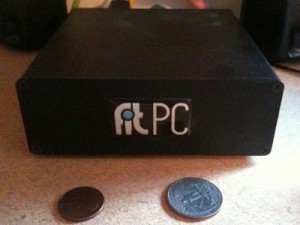Archive for December, 2008
Just a sec…
0As we are all counting down to welcome in 2009, we should be reminded to wait just a second, to stop wishing our lives away.
At 7pm Eastern time (midnight UTC), the official international time-keeping standards body inserted a “leap second” into the normal stream of ordinary seconds.
This is done periodically to keep our standard clocks (UTC) in sync with “mean solar time”, which is based on the Earth’s position and rotation. If we did not do that, then Earth-related events such as midnight and noon would gradually shift to different times of the day (likewise, without leap days, the equinoxes and solstices would gradually shift through the year).
At home, I could witness this historic event in the logs of my Linux-based server, bender.
Dec 31 18:59:59 Clock: inserting leap second 23:59:60 UTC
How did YOU spend YOUR leap second?
Comments?
10My friend Tanner suggested that I am short-selling myself by not allowing others to add comments to my blog.
Since I started this blog as an experiment to familiarize myself with different types of content management software, it never occurred to me to open it up (in fact, I was surprised that anyone actually read it at all). My initial installation was “locked down” to reduce the potential avenues for spam.
So today, I turned on comments. It required a little bit of SQL tinkering to enable comments on past posts… I hope I did not mess anything up.
Let us know what you think.
In the dark
0The power was out at work this morning. We have massive generators to keep the labs powered, but the offices were in the dark. The whole building was filled with the beeping of dying UPS’s.
USB on VirtualBox (non-OSE)
0I spent most of Sunday trying to get a USB device to work under Windows XP, running inside of VirtualBox OSE on an Ubuntu host. I found lots of how-to’s, mostly involving permissions on /dev/bus/usb and /proc/bus/usb, and also comments about /etc/fstab. However, the part that was not inherently obvious was that VirtualBox OSE (the “Open Source Edition”) does not support USB. However, the non-OSE version does.
Again, VirtualBox OSE does not support USB.
So I downloaded the non-OSE version (actually, on Ubuntu, you can simply add a line to your apt sources file and use the normal apt tools to install it). Within minutes, my USB devices showed up. From what I understand, you do still need to make sure to mount /dev/bus/usb.
root@kimono:~$ grep vbox /etc/group vboxusers:x:125:alan root@kimono:~$ grep usb /etc/fstab none /proc/bus/usb usbfs devgid=125,devmode=664 0 0 root@kimono:~$ mount | grep usb none on /proc/bus/usb type usbfs (rw,devgid=125,devmode=666) root@kimono:~$
Fit PC
0Earlier this year, my old faithful home server, “buster”, died. Buster was a hand-me-down 500 MHz Pentium III, and his role in my house was file server, print server, DHCP/DNS server, web server, router/firewall, VPN server and for a couple of years, a mail server. He also performed some odds and ends: turning on/off my Christmas tree lights via X10, emailing me every morning with birthday reminders, fetching RSS feeds, and processing updated geocache information into Palm and Lowrance GPS formats. In his last days, buster also filled a unique roll as a squid proxy, serving up an “upside down internet” on an open wireless network. It might have been this final task that drove him mad. His RAM was fried.
I hastily replaced buster with a WRT54g router, on which I tried both the Tomato and dd-wrt alternative firmwares. Both of them did a terrific job.
However, I still wanted a file server that could remain on 24 hours per day, one that I could store files on, and one that would share my printer. I also missed having a VPN. In short, I wanted a replacement for buster. However, what I did not want was a power-hungry box that made a lot of noise.
I finally settled on a Fit PC 1.0 (not to be confused with their newer model, the Fit PC slim. The Fit PC 1.0 has about the same specs that buster had: 500 MHz Geode, 256 MB of RAM, USB 2.0 ports. But what it does not have is a hungry power appetite. It uses only 3-5 watts of power! And it is fanless and silent.
I call this new Fit PC mini-server “bender”, and I look forward to working together with him.
